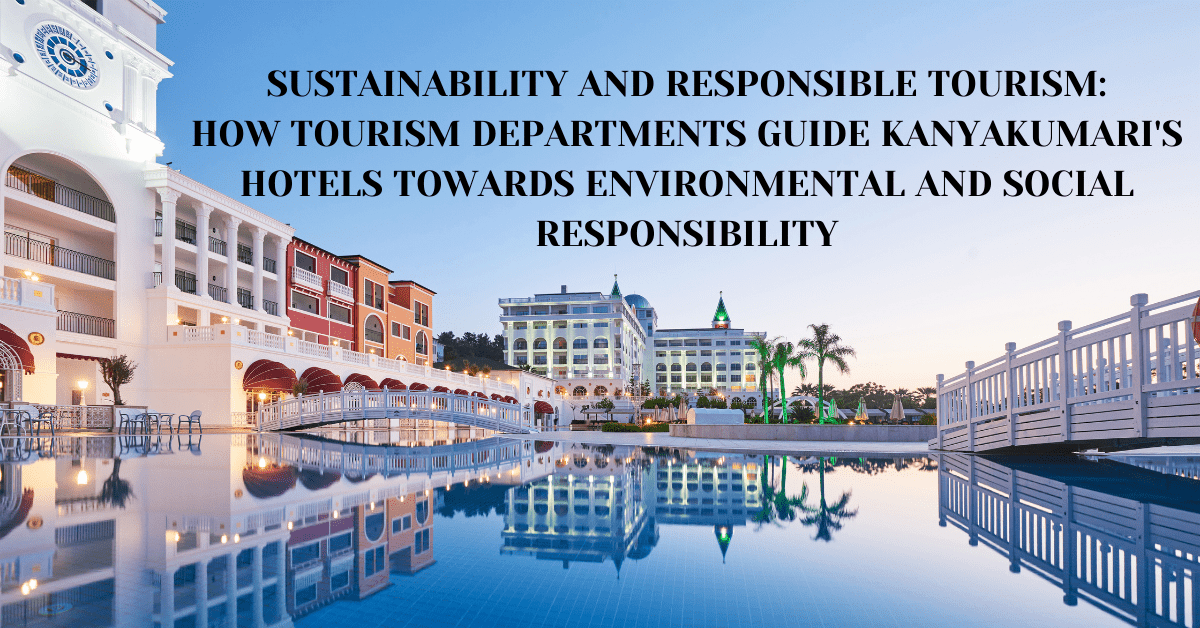
Nestled along the southern coast of India, Kanyakumari is a destination renowned for its natural beauty, cultural heritage, and stunning coastal vistas. As tourists flock to this idyllic locale to soak in its charm, the importance of sustainability and responsible tourism practices becomes increasingly evident. In recent years, the tourism department in Kanyakumari has taken proactive steps to guide hotels in the region towards environmental and social responsibility, ensuring that the tourism industry thrives while minimizing its impact on the environment and local communities.
Embracing Sustainability in Hospitality
The concept of sustainability in hospitality extends beyond reducing carbon footprints and conserving natural resources; it encompasses a holistic approach that considers environmental, social, and economic aspects. Hotels at Kanyakumari are encouraged to adopt sustainable practices that promote conservation, minimize waste generation, and support local communities. This includes initiatives such as energy-efficient lighting and appliances, waste recycling programs, and sourcing locally-produced goods and services to reduce carbon emissions associated with transportation.
Promoting Responsible Tourism
Responsible tourism goes hand in hand with sustainability, focusing on minimizing negative impacts on local cultures, economies, and ecosystems while maximizing the benefits for host communities. In Kanyakumari, hotels are encouraged to engage in responsible tourism practices that respect local traditions, support local businesses, and contribute to community development initiatives. This may involve organizing cultural exchanges, promoting traditional crafts and cuisine, and supporting community-based tourism projects that empower local residents and preserve cultural heritage.
Guidance from Tourism Departments
The tourism department in Kanyakumari plays a crucial role in guiding budget hotels in Kanyakumari towards sustainability and responsible tourism practices. Through workshops, seminars, and training programs, hoteliers are educated about the importance of environmental conservation, social responsibility, and sustainable development in the tourism industry. The tourism department also provides resources, guidelines, and best practices to help hotels implement sustainable initiatives and monitor their progress towards achieving sustainability goals.
Certification and Recognition
To incentivize hotels to embrace sustainability and responsible tourism, the tourism department in Kanyakumari may offer certification programs or recognition schemes for hotels that demonstrate exemplary environmental and social performance. These certifications not only showcase a hotel’s commitment to sustainability but also serve as a marketing tool to attract eco-conscious travellers who prioritize environmentally friendly accommodations. By participating in these programs, hotels can differentiate themselves in the competitive tourism market while contributing to the broader goals of sustainable tourism development.
Collaboration and Partnership
Achieving sustainability in the tourism industry requires collaboration and partnership among various stakeholders, including government agencies, non-profit organizations, local communities, and businesses. In Kanyakumari, the tourism department fosters collaboration between hotels and other stakeholders to address common sustainability challenges, share best practices, and implement joint initiatives that benefit the destination as a whole. By working together towards shared sustainability goals, hotels can amplify their impact and contribute to the long-term sustainability of Kanyakumari’s tourism industry.
Challenges and Opportunities
While the journey towards sustainability and responsible tourism presents challenges, it also offers opportunities for innovation, differentiation, and growth. Hotels in Kanyakumari with tariff may face challenges such as high initial investment costs, limited awareness and understanding of sustainable practices, and resistance to change. However, by embracing sustainability as a core value and leveraging it as a competitive advantage, hotels can attract eco-conscious travellers, reduce operating costs, and enhance their reputation as responsible corporate citizens.
Conclusion
Sustainability and responsible tourism are integral to the long-term success and viability of the tourism industry in Kanyakumari. By guiding hotels towards environmental and social responsibility, the tourism department plays a vital role in ensuring that tourism development in the region is sustainable, inclusive, and beneficial for all stakeholders. Through collaboration, education, and innovation, hotel in Kanyakumari can embrace sustainability as a guiding principle, contributing to the preservation of the destination’s natural beauty, cultural heritage, and socioeconomic well-being for generations to come.